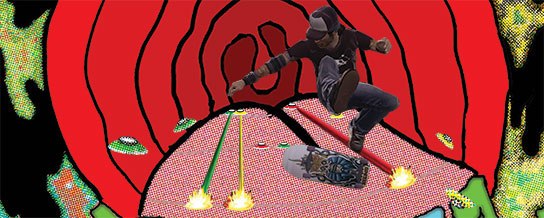License to Thrill
Activision’s Tim Riley pulls off some of the music industry’s biggest coups. Tim Riley has […]

License to Thrill
Activision’s Tim Riley pulls off some of the music industry’s biggest coups. Tim Riley has […]

Activision’s Tim Riley pulls off some of the music industry’s biggest coups.
Tim Riley has a sweet job. His title, “Worldwide Executive of Music,” sounds serious and, to some extent, it is: Riley is ultimately responsible for all of the music licensing for videogame publisher Activision’s entire stable of games, from Guitar Hero to True Crime to Tony Hawk’s Pro Skater. He brokers million-dollar artist deals, rubs shoulders with the likes of Jay-Z and Interscope’s Jimmy Iovine–basically, he’s one of the major players in the ever-growing intersection between games and music.
Set deep in the back of Activision’s cubicle farm in Santa Monica, CA, Riley sits in his black matte sanctuary; a converted recording room transformed into a soundproof workspace, it has been visited by Johnny Rotten, Slash, and Cut Chemist, among others. Awards, autographed Guitar Hero controllers, and more eBay-worthy music paraphernalia than you can shake a sensor-loaded drum stick at cover the walls, along with boxes and boxes of albums that Riley receives each day for possible inclusion in Activision’s games.
Less than 10 years ago, getting artists to lend their music to game soundtracks–never mind creating original music for them–took begging, pleading, and plenty of cash. These days, things are a whole lot easier. Riley has more weight to throw around than anyone in this industry–a level of power that once belonged to scions of the record industry. Now, the artists come to him. As we chat, Riley’s email inbox dings with a message from Wyclef Jean, requesting a meeting.
But not everyone gets to email directly. “There are a few different ways for bands or artists to get their music into Activision games,” says Riley, “but the most common method is really just to send us a CD. We spend a lot of time at live shows, reading the trades, music magazines, and websites, and even looking for unsigned acts on MySpace–it’s super-important for us to see where the music trends are, and to try to deliver our customer the absolute best music possible in all the Activision releases.”
Riley came to Activision with more than a decade of street cred; he’s worked at Jive, Giant/Revolution, Warner Bros., and Geffen. All the A&R hustle paid off: When he started doing freelance music consultation for Activision, he already had established relationships with artists and labels, which made getting big names into games infinitely easier. Activision gave him the go-ahead to create an internal music department at the company–arguably the first of its kind.
With the next generation of gaming consoles, Riley believes we’ve just begun to scratch the surface. “These new machines give us so much more space and speed to work with,” he says. “It allows us to host more music-based content, and with the downloading capabilities they offer, I think we’ve only just cracked the seal on downloading music through games.
“It’s been said before, but I kinda like the analogy: Videogames are becoming like the new college radio,” he continues. “You want exposure? Get on the Tony Hawk soundtrack, and everyone who plays it will hear your song a million times.”
Of course, much of how the actual licensing deals work depends on the individual title. “Without getting into particulars, I can tell you that with a game like Tony Hawk, most all of the music is licensed on a non-exclusive buyout term–and with a music-based game like Guitar Hero, the music is licensed under a royalty-type of agreement. And the fees will differ from artist to artist.”
Riley got Jurassic 5 to create an original song for the Fantastic Four trailer, and worked with Swizz Beatz on a slew of original remixes for Shark Tale–“Car Wash” and “Play That Funky Music,” to name a couple. He’s working with Radiohead on some stuff he can’t talk about–and that’s just the tip of the iceberg.
And certainly, logistics can’t be ignored. “There have been so many situations where we’ve got things set to work with a band, and they literally just can’t findthe masters,” says Riley.
Sometimes the deal simply gets scrapped, but other times there are alternate avenues to explore. Riley enticed Living Color to re-record “Cult of Personality” for Guitar Hero, and guitarist Vernon Reid even added a part to make the song harder to play. But of all the coups Riley has staged, convincing the Sex Pistols–who hadn’t been together in the studio in about 30 years–to re-record “Anarchy in the U.K.” at the Dust Brothers’ Los Angeles compound may be his biggest, boldest move yet. With this sort of power, Riley may just be singing a different tune in the years to come: “Videogames Killed the Video Star.”
Guitar Hero III: Legends of Rock and Tony Hawk’s Pro Skater 4 are out now from Activision.

